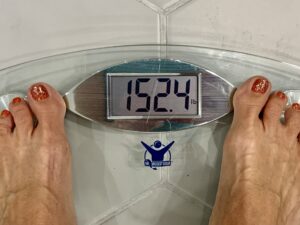As my weight stagnates week after week in the low 150 range, I am working more and more on my thinking and how I am creating these results. What I’m doing is very effective for maintaining my weight at a normal BMI (which, for my 5-foot-6 frame, is 154 or less). It’s allowing me to sometimes eat when I’m not hungry, or to overeat because I’m stressed out, or to periodically binge on sugar. It really *IS* good enough, if I judge “good enough” by my BMI and other health parameters like my blood pressure, lipid profile, or blood sugar. But if I judge my success by whether I have a peaceful mind that can take or leave food without a second thought, that isn’t obsessing over what I’m going to eat at my next meal, or that isn’t constantly feeling like I am white knuckling to resist the intense urge to eat sugar, then I am failing.
I am happy with my weight loss success. I’m proud to have lost 150 pounds. But I just want the mental food drama, the overdesire, to go away.
Part of my work over the past month or more of this plateaued weight has been to investigate why I continue to follow my plan to a tee for a few days, see the scale inch downward, and then quickly “relax” and eat off plan. Cookies, ice cream, and brownies have all found their way into my belly over the past 2 weeks as I neared the 140s. And once I eat off plan (e.g., a tiny 2-bite brownie), my primitive brain immediately jumps for joy and says, “Woohoo! Now let’s eat them ALL!” …and I usually do. Sometimes immediately, sometimes after an internal debate, and sometimes after practicing to just allow the urge to be there and sitting with it, feeling the urge dissipate, and then suddenly – instantly – acting on the urge anyway and stuffing them into my mouth (Primitive Brain: “Quick! Eat them before her prefrontal cortex realizes what we are doing!”). My weight is at a plateau around 150-153 for 10 weeks now not because my protocol doesn’t work, but rather because I keep going off my protocol.
Why?
One big reason is a psychological phenomenon called the Abstinence Violation Effect. The addiction psychologist G. Alan Marlatt coined the term to describe the behavior of addicts in which an initial indulgence leads to the consumption of way more of the forbidden substance than originally planned. For example, “just one drink” can lead to the whole bottle and a blackout for an alcoholic. The relapse often leads to feelings of shame and self-flagellation. Addicts think that there is something wrong with them and blame their relapse on a fixed character trait: “I am an addict, I am incapable of controlling myself. It’s in my DNA.” This lack of self efficacy can often lead to a downward spiral of continued (perhaps fewer) attempts at abstinence and continued relapses.
Dieters often respond the same way to food restriction. We resist and resist and resist, and then when we make the decision to have a cookie, our brains light on fire and tell us to “F*** it! You’ve already screwed up so you might as well go for it and eat the rest. You can get back on track tomorrow.”
How many times have you told yourself you’ll get back on track tomorrow? Or Monday? Or the first of the month?
So. Many. Times.
We look at the big picture and beat ourselves up, thinking we will never be able to stick to our food plan. That we are incapable of succeeding. That we will never reach our goal weight. How many times have I blamed my eating on fixed character traits? “I’m a sugar addict: I am just can’t help myself.” Or, “It’s in my DNA: my whole family struggles with obesity.” These thoughts lead me to be more likely to stop following my plan, to just say, “F*** it! I’m eating all the brownies!” And this leads me to fail to reach my goal weight.
The Abstinence Violation Effect is just one of many psychological phenomena that are at play in our brains as we work on eating only the healthy foods that serve us and our bodies. Reframing our thoughts about a relapse if and when it occurs is a key strategy to combatting the Abstinence Violation Effect and lessening its power over us — attributing the fact that we ate all the brownies to a simple (if deeply rooted) habit that can be changed rather than to a permanent, deep internal flaw is critical to continued behavior change and weight loss success. Because it IS just a habit. And we can change.

Project 135 stats:
Starting weight: 159.6
Week 1: 157.2
Week 2: 155.6
Week 3: 155.4
Week 4: 153.8
Week 5: 151.0
Week 6: 152.8
Week 7: ? (Dad’s death)
Week 8: 150.8
Week 9: 152.6
Week 10: 154.2
Week 11: 152.6
Week 12: 150.8
Week 13: 150.6
Week 14: 151.6
Week 15: 152.4
Total weight loss: 7.2 pounds (4.5%)

